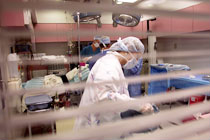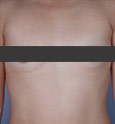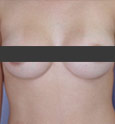
Breast Enhancement Surgery Center
 Our plastic surgeons and the operating room team perform most surgical procedures at the Marina Outpatient Surgery Center, a Los Angeles breast surgery center located in Marina del Rey, California. This facility is fully accredited by American Association for Accreditation of Ambulatory Surgery Facilities (AAAASF) and all anesthesiologists are certified by the American Board of Anesthesiology with training and certification in advanced cardiac life support (ACLS). Please request the name of the anesthesiologist assigned to your case to verify their board certification.
Our plastic surgeons and the operating room team perform most surgical procedures at the Marina Outpatient Surgery Center, a Los Angeles breast surgery center located in Marina del Rey, California. This facility is fully accredited by American Association for Accreditation of Ambulatory Surgery Facilities (AAAASF) and all anesthesiologists are certified by the American Board of Anesthesiology with training and certification in advanced cardiac life support (ACLS). Please request the name of the anesthesiologist assigned to your case to verify their board certification.
The AAAASF was established in 1980. Its primary mission is to ensure the highest quality patient care in the ambulatory surgery setting. Today, with more than 550 accredited outpatient surgical facilities, the not-for-profit AAAASF is the largest accrediting organization of its kind in the United States.
These days, there is more to having surgery than just selecting your surgeon.
 AAAASF has designed an accrediting program to help provide patients with the assurance of safety and quality in all aspects of their outpatient surgery experience. To achieve this goal, every AAAASF-accredited ambulatory surgery facility must meet stringent national standards for equipment, operating safety, personnel and surgeon credentials. The experts at AAAASF know that maintaining safety and quality in the ambulatory surgery facility is a dynamic process, requiring constant review and revision of standards to reflect the current state-of-the-art. As the leading accrediting organization, AAAASF has developed the systems to effectively monitor and implement the latest advances in outpatient care delivery-advances that directly benefit patients.
AAAASF has designed an accrediting program to help provide patients with the assurance of safety and quality in all aspects of their outpatient surgery experience. To achieve this goal, every AAAASF-accredited ambulatory surgery facility must meet stringent national standards for equipment, operating safety, personnel and surgeon credentials. The experts at AAAASF know that maintaining safety and quality in the ambulatory surgery facility is a dynamic process, requiring constant review and revision of standards to reflect the current state-of-the-art. As the leading accrediting organization, AAAASF has developed the systems to effectively monitor and implement the latest advances in outpatient care delivery-advances that directly benefit patients.
AAAASF accreditation has been recognized as the “gold standard.”
The vast majority of ambulatory surgery facilities are unaccredited, operating independent of any peer review and inspection process. A growing number of states throughout the country, however, are recognizing the need for mandatory accreditation. AAAASF is in the forefront of legislative efforts to provide patients with safety and quality assurance in the outpatient surgery setting.
In 1996, California became the first state to mandate accreditation for all outpatient facilities that administer sedation or general anesthesia. AAAASF was instrumental in the development of the California legislation (AB 595) as well as subsequent laws and regulations adopted by states such as Florida, Georgia, New Jersey, Pennsylvania and Texas. AAAASF accreditation guidelines have been recognized as the “gold standard,” providing the highest level of safety and quality in ambulatory surgical care.
The majority of private insurance carriers recognize accreditation by AAAASF for reimbursement of covered procedures. AAAASF accreditation has been approved by state Departments of Health in lieu of state licensure and, with additional standards, has been approved for deemed status in lieu of Medicare certification.
AAAASF-accredited facilities must meet stringent requirements.
All AAAASF-accredited facilities must:
- Comply with applicable local, state, and federal regulations including fire safety, sanitation and building codes for the protection of patients and medical personnel
- Adhere to federal laws and regulations affecting their operation such as OSHA blood-borne pathogens standards, hazardous waste standards, and the Americans with Disabilities Act
- Utilize advanced instruments and monitoring devices for patient safety during surgery and in the recovery period
- Allow surgery to be performed only by qualified surgeons who have privileges to perform the same surgical procedures in an accredited hospital. Surgeons must meet the standards, such as peer-review and continuing medical education, required for operating in an accredited hospital. Surgeons must be certified (or eligible for certification) in surgical specialties recognized by the American Board of Medical Specialties. This is an important distinction between AAAASF and other organizations that may not require this high standard of qualifications for physicians operating within their accredited facilities
- Provide for the administration of general anesthesia, when appropriate, by a board-certified or board-eligible anesthesiologist or a certified registered nurse anesthetist. Other personnel assisting in surgery and providing care for the patient in the recovery room include specially trained and certified surgical technicians, registered nurses, and licensed practical nurses
AAAASF is committed to quality assurance and peer-review.
AAAASF rigorously inspects and evaluates each facility seeking accreditation to ensure that it meets the highest standards. After accreditation is achieved, AAAASF requires an annual in-house evaluation to identify any areas that may need improvement. Every three years, a formal site inspection is performed by a trained AAAASF representative.
AAAASF-accredited facilities are continually monitored and improved through the analysis of individual facility performance compared to established standards. One of the innovative ways in which AAAASF evaluates patient care and cost containment is through its documented quality assurance and peer-review program. This program, now accessible through the Internet, allows for:
- Random case review and analysis for compliance with preoperative, intraoperative and post-operative requirements
- Compilation of unanticipated events for action to address problems and improve patient care
- Sharing of current scientific data with relevance to the provision of outpatient surgical services
AAAASF accreditation is available for three classes of ambulatory facilities.
The AAAASF class designation is based on the type of anesthesia administered in the facility and the corresponding standards necessary to ensure patient safety.
Class A Facilities
All surgical procedures are performed under local or topical anesthesia.
Class B Facilities
Surgical procedures are performed as described for Class A, and/or intravenous or parenteral sedation, regional anesthesia, analgesia or dissociative drugs.
Class C Facilities
Surgical procedures are performed as described for Classes A and B, and/or
Endotracheal or laryngeal mask intubation or inhalation anesthesia, spinal and epidural (includes nitrous oxide), administered by an anesthesiologist or Certified Registered Nurse Anesthetist (CRNA).
AAAASF accreditation is today’s best assurance of safety, quality and efficiency.
Studies have demonstrated that, typically, the cost of a patient for a procedure performed in an accredited ambulatory surgery facility is only one-third to one-half of the cost for the same procedure performed in a hospital. But this is only part of the story. One of the factors contributing to lower cost is the outstanding safety record of accredited ambulatory facilities. It has been shown that the incidence of complications in an accredited outpatient facility is comparable to that of a hospital-based ambulatory surgery facility. Safety plus low cost make the accredited ambulatory surgery facility an attractive option.
The bottom line is that AAAASF accreditation is today’s best assurance of safety, quality and efficiency in the outpatient surgery environment. It is a program that has achieved wide recognition from the medical community, state legislatures, state and national health care agencies, insurance companies and patients.
AAAASF is dedicated to the goals of ensuring quality and patient safety while providing innovative, cost-containing solutions for patient care in the ambulatory surgery setting.
Please contact us at 877.298.9915 in Marina Del Rey with your questions or comments about AAAASF-accredited facilities.







